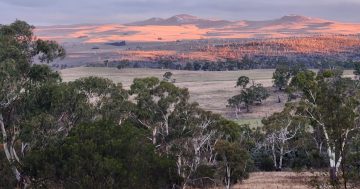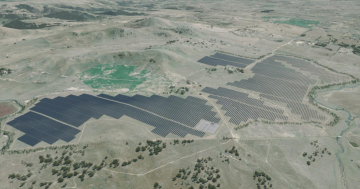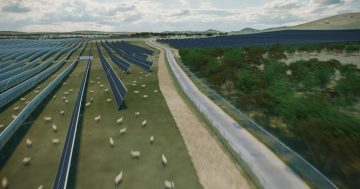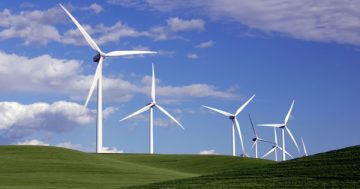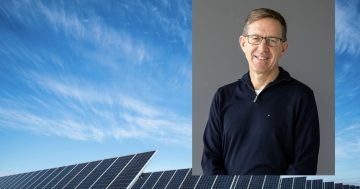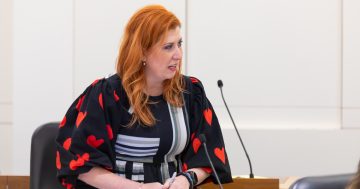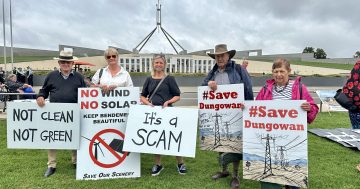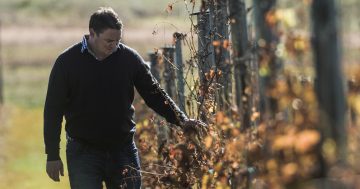
Earlier this year CE4G President Ed Suttle announced Goulburn’s community solar farm was on track for construction to begin in March 2019. He now says a lack of energy policy consistency has delayed the project. Photos: Maryann Weston.
When former Prime Minister Malcolm Turnbull was ousted, his National Energy Guarantee (NEG) went with him. Caught in the backwash has been Goulburn’s long-awaited community solar farm which has been put on hold until there’s more energy policy certainty on renewables.
It’s not uncommon that regional and rural Australia gets put on the back burner when Canberra politicians upend policy and, often, we have to start again; that’s the political cycle. However, the irony of the Goulburn solar farm’s suspension is that it is occurring right under the nose of the newly minted Energy Minister Angus Taylor who is also the local MP for Hume, which has Goulburn at its heart.
The Goulburn solar farm project was ambitious but inspirational. Driven by the not-for-profit Community Energy 4 Goulburn (CE4G), once established, it will be the largest community-owned solar farm in Australia. Behind CE4G are dedicated Goulburn people, passionate about solar energy and helping create fairness and equity for consumers struggling with rising power prices.
Love or hate renewables, the story of the Goulburn solar farm is a local mirror of energy policy hijacked by politics. The new Energy Minister has recently announced that there will be no further Renewable Energy Target after 2020. Rather, the focus of new policy will be on calling the big power companies to account for prices, and on extending the life of existing coal and gas plants to boost supply.
“This government’s solutions will not be driven by ideology or grand gestures, but pragmatism,” Minister Taylor told the Australian Financial Review recently.
Turnbull’s NEG, which was panned for its lack of government subsidies for renewables, at least pushed a low-emissions obligation which meant the energy companies had to have a mix of renewables in their energy production.
What’s less clear post-NEG is where the government support [and policy] for renewables is likely to fall, though there is still the commitment to the Paris Accord targets. However, the former Energy Minister and architect of the NEG, Josh Frydenberg (now the Treasurer), implied that the dumping of Turnbull’s energy policy equals failure to land sustained policy on low emissions.
So what does all this mean for the Goulburn solar farm project? That’s what its proponents are still trying to figure out, but it’s enough to stall the project according to CE4G President Ed Suttle.
“There has been delay after delay since we completed the feasibility study on the solar farm in April 2016 with the DA taking 11 months and the contractual arrangements with Essential Energy still unfinished after 10 months. Then last month the LNP put the NEG in the bin and we’re yet to see a [detailed] energy policy. We do know that the Energy Minister Angus Taylor has said there will be no Renewable Energy Targets after 2020,” Mr Suttle said.
“In the absence of policy, nobody can predict whether electricity prices are going to go up or down. We were going to raise $2.5m from the Goulburn community to fund the project confident we would be able to give investors a 4% return on their money; but without energy policy certainty, for the time being, accurate revenue and ROI forecasts are impossible, so we are simply unable to move forward.
“We’re hoping to be price competitive, but it’s a difficult path without government assistance. In Denmark, the UK and Germany, where community renewable projects abound, they received considerable initial government support. The Hepburn Windfarm in Victoria, a community-owned project, received $1.725m from the Victorian Government. We’ve received a paltry $52,000 from the NSW Government for the feasibility study but nothing since.

The Goulburn Solar Farm has the potential to be a drawcard for the City, particularly capitalising on renewable energy tourism and support.
CE4G was recently encouraged to put in a proposal for NSW Government support but despite early enthusiasm, hasn’t heard back from the government yet. Encouragingly though, Minister for Family and Community Services and Member for Goulburn Pru Goward has said there may be funds available from a new fund late this year.
But Ed Suttle stresses: “It’s not over now for the solar farm. CE4G hopes to push forward once there is government energy policy certainty.”
“We want the project to happen. It is so visible: adjacent to both road and rail when entering Goulburn from the North. It will demonstrate that Goulburn is leading NSW with its use of renewable energy sources,” he said.
“Climate change demands a transition towards renewables but currently the signals are that ideologically the Federal Government is heavily into fossil fuels and lightly into renewables.”
With a federal election looming sometime in the first half of next year, CE4G are keeping their options open. They are awaiting firmer energy policy on renewables from the Scott Morrison Government, and ALP energy policy clearly backs clean energy and renewables. There’s also the possibility of further assistance at the state government level.
“The indecision on renewable energy policy is so expensive for these type of community projects. Yes, we are in the Paris Accord but there’s no consistency of policy and we can’t plan accordingly. We are really committed to the project but can’t move forward until there is more certainty. In the meantime, we’ll look into our Project 2 which is putting sizeable solar panel installations on roofs behind the metre.”
So while the ideological pendulum swings between the fossil fuels versus renewables, the countdown begins to election time, federally and for the NSW electorate too. Adding to the complexity of this story is a recent survey which showed that the majority of voters in the Hume electorate want more support for renewables across a number of factors.
It’s no wonder ambitious community projects like CE4G’s, which are backed by not-for-profit passion and commitment trying to achieve big things, wind up stalled by the lack of consistency and bipartisanship so evident in polarised politics today.












